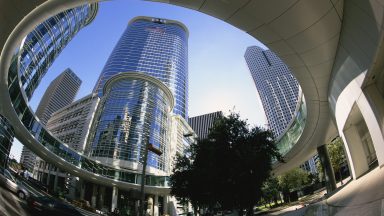
Enron may have gone bankrupt two decades ago, but it never completely closed its doors. Now that the company is making headlines, finance enthusiasts are recalling the infamous 2001 scandal that destroyed Enron’s credibility. Learn all about what Enron’s executives did and the corporation’s downfall, below.
What Is Enron?
Enron is a Houston, Texas-based natural gas and energy company that was originally founded by Kenneth Lay in the 1980s. The corporation expanded throughout the 1990s, reportedly employing more than 20,000 staff members. However, by the early 2000s, Enron went bankrupt due to a financial scandal.
What Did Enron Do to Go Bankrupt?
In 2001, a fraudulent scheme was uncovered within Enron’s accounting system — eventually dubbed the “Enron Scandal.” Before he stepped down as the company’s CEO, Lay told the public, the media and Enron’s investors that the corporation’s stock had been doing well. However, that was not the case, and he was later found guilty of multiple counts of conspiracy, fraud and insider trading.
Before he could serve his scheduled sentencing, Lay died in 2006.
Enron CEO Jeffrey Skilling was also convicted of multiple counts of fraud, insider trading and conspiracy. He was sentenced to serve 17 years behind bars and ordered to repay the victims of Enron’s fraud about $40 million. Skilling’s sentence was reportedly reduced to about 14 years, and he was released in 2019.

Is Enron Back in 2024?
On December 2, 2024, Enron announced its relaunch. Per the corporation’s press release, Enron provided a detailed list of its goals. The company also acknowledged its controversial past and noted that it’s looking toward a different future.
“Enron Corporation today announced its relaunch as a company dedicated to solving the global energy crisis,” the press release noted. “With a bold new vision, Enron will leverage cutting-edge technology, human ingenuity, and the spirit of adaptation to address the critical challenges of energy sustainability, accessibility, and affordability.”
Enron unpacked its list of “key pillars,” which consisted of “adaptation as strength,” “leadership by example,” “forgiveness and progress,” “permissionless innovation” and “solving the energy crisis.”
“Recognizing that the energy landscape is in constant flux, Enron commits to continuous innovation and agility to address evolving demands, from renewable energy integration to climate resilience,” the announcement pointed out. “Enron’s leadership team is focused on setting a high standard for ethical business practices, transparency, and sustainability, serving as a model for corporate responsibility worldwide.”
The corporation also painted its “a forward-looking approach that prioritizes collective growth and learning,” adding that “decentralized technology is advancing, and we will of course have a role to play in its future.”
“Enron will focus on scalable, sustainable solutions, including investments in renewable energy infrastructure, cutting-edge energy storage, and advanced power distribution systems,” the company added in its press release.






























